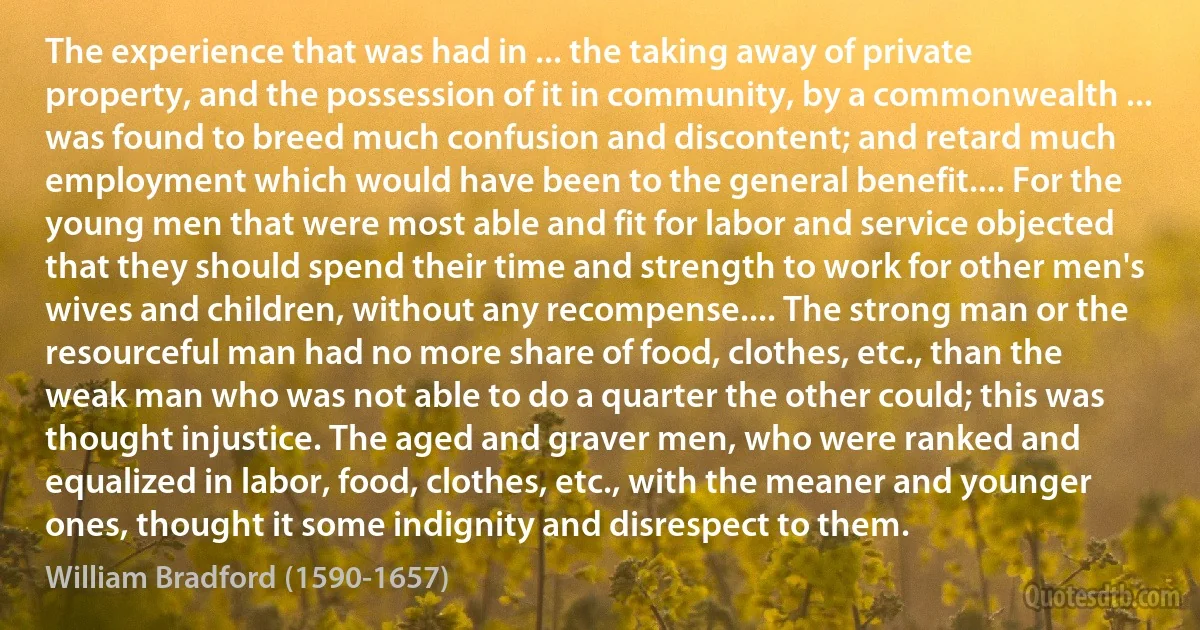Quarter Quotes - page 14
I am overwhelmed by your letter yesterday, and I hope with all my heart and for you and for the patriotic work that we are pursuing that you do not persevere in your desire to leave the administration of the Congo. Please come and see me in Brussels on Saturday at a quarter past one.

Leopold II of Belgium
Not without a slight shudder at the danger, I often perceive how near I had come to admitting into my mind the details of some trivial affair, - the news of the street; and I am astonished to observe how willing men are to lumber their minds with such rubbish, - to permit idle rumors and incidents of the most insignificant kind to intrude on ground which should be sacred to thought. Shall the mind be a public arena, where the affairs of the street and the gossip of the tea-table chiefly are discussed? Or shall it be a quarter of heaven itself, - an hypæthral temple, consecrated to the service of the gods? I find it so difficult to dispose of the few facts which to me are significant, that I hesitate to burden my attention with those which are insignificant, which only a divine mind could illustrate. Such is, for the most part, the news in newspapers and conversation. It is important to preserve the mind's chastity in this respect.

Henry David Thoreau
The population of these Pueblos will average nearly five hundred souls each (though some hardly exceed one hundred), making an aggregate of nine or ten thousand. At the time of the original conquest, at the close of the sixteenth century, they were, as has been mentioned, much, perhaps ten-fold, more numerous. Ancient ruins are now to be seen scattered in every quarter of the territory: of some, entire stone walls are yet standing, while others are nearly or quite obliterated, many of them being now only known by their names which history or tradition has preserved to us.

Josiah Gregg
I have labored much in sciences and languages, and I have up to now devoted forty years [to them] after I first learned the Alphabetum; and I was always studious. Apart from two of these forty years I was always [engaged] in study [or at a place of study], and I had many expenses just as others commonly have. Nevertheless, provided I had first composed a compendium, I am certain that within quarter or half a year I could directly teach a solicitous and confident person whatever I know of these sciences and languages. And it is known that no one worked in so many sciences and languages as I did, nor so much as I did. Indeed, when I was living in the other state of life [as a Magister], people marveled that I survived the abundance of my work. And still, I was just as involved in studies afterwards, as I had been before. But I did not work all that much, since in the pursuit of Wisdom this was not required.

Roger Bacon
The greatest minds are marked by nothing more distinctly than an inconceivable humility, and acceptance of work or instruction in any form, and from any quarter. They will learn from everybody, and do anything that anybody asks, so long as it involves only toil, or what other men would think degradation.

John Ruskin
...as the great Unitarian preacher Channing pointed out, that in France and Spain there are multitudes who have proceeded from rejecting Popery to absolute atheism, because "the fact is, that false and absurd doctrines, when exposed, have a natural tendency to beget skepticism in those who receive them without reflection. None are so likely to believe too little as those who have begun by believing too much." Here is, indeed, the terrible danger of believing too much. But no! the terrible danger comes from another quarter - from seeking to believe with the reason and not with the life.

Miguel de Unamuno
We, therefore, having directed our inquiry toward a cause that is manifest, sensible, and comprehended by all men, do know that the earth rotates on its own poles, proved by many magnetical demonstrations to exist. For not in virtue only of its stability and its fixed permanent position does the earth posses poles and verticity; it might have had another direction, as eastward or westward, or toward any other quarter. By the wonderful wisdom of the Creator, therefore, forces were implanted in the earth, forces primarily animate, to the end the globe might, with steadfastness, take direction, and that the poles might be opposite, so that on them, as at the extremities of an axis, the movement of diurnal rotation might be performed.

William Gilbert (astronomer)
The injustice and aggression inflicted on the Palestinian Arab people is unparalleled in history, even in the dark ages. An entire people has been displaced from their land and homeland to replace another people. The Arab States have appealed to the world's conscience for nearly a quarter of a century to realize the right and lift the injustice against them, but our pleas have not been heeded, forcing them to take up arms in defense of their rights, lands and sanctities.

Faisal of Saudi Arabia
Now it is up to all of us, all the participants in the European process, to make the best possible use of the groundwork laid down through our common efforts. Our idea of a common European home serves the same purpose too. It was born out of our realization of new realities, of our realization of the fact that the linear continuation of the path, along which inter-European relations have developed until the last quarter of the twentieth century, is no longer consonant with these realities. The idea is linked with our domestic economic and political perestroika which called for new relations above all in that part of the world to which we, the Soviet Union, belong, and with which we have been tied most closely over the centuries.

Mikhail Gorbachev
In every chapter of this book, mention has been made of the money-making secret which has made fortunes for more than five hundred exceedingly wealthy men whom I have carefully analyzed over a long period of years. The secret was brought to my attention by Andrew Carnegie, more than a quarter of a century ago. The canny, lovable old Scotsman carelessly tossed it into my mind, when I was but a boy. Then he sat back in his chair, with a merry twinkle in his eyes, and watched carefully to see if I had brains enough to understand the full significance of what he had said to me. When he saw that I had grasped the idea, he asked if I would be willing to spend twenty years or more, preparing myself to take it to the world, to men and women who, without the secret, might go through life as failures. I said I would, and with Mr. Carnegie's cooperation, I have kept my promise. Author's Preface.

Napoleon Hill
All parties seem to be agreed on one point, that the dialects commonly spoken among the natives of this part of India contain neither literary nor scientific information, and are moreover so poor and rude that, until they are enriched from some other quarter, it will not be easy to translate any valuable work into them.

Thomas Babington Macaulay
I am trying to describe the people in our quarter, not for the mere curiosity, but because they are all part of the story. Poverty is what I am writing about, and I had my first contact with poverty in this slum. The slum, with its dirt and its queer lives, was first an object-lesson in poverty, and then the background of my own experiences. It is for that reason that I try to give some idea of what life was like there.

George Orwell
As capitalism and bourgeois society triumphed, the prospects of alternatives to it receded, in spite of the emergence of popular politics and labour movements. These prospects could hardly have seemed less promising in, say 1872–3. And yet within a very few years the future of the society that had triumphed so spectacularly once again seemed uncertain and obscure, and movements to replace it or to overthrow it had once again to be taken seriously. We must therefore consider these movements for radical social and political change as they existed in the third quarter of the nineteenth century.

Eric Hobsbawm
Indeed I scarce ever heard or saw the introductory Words, Without Vanity I may say, etc. but some vain thing immediately follow'd. Most People dislike Vanity in others whatever Share they have of it themselves, but I give it fair Quarter wherever I meet with it, being persuaded that it is often productive of Good to the Possessor and to others that are within his Sphere of Action: And therefore in many Cases it would not be quite absurd if a Man were to thank God for his Vanity among the other Comforts of Life.

Benjamin Franklin
My Soul. Such fullness in that quarter overflows
And falls into the basin of the mind
That man is stricken deaf and dumb and blind,
For intellect no longer knows
Is from the Ought, or knower from the Known -
That is to say, ascends to Heaven;
Only the dead can be forgiven;
But when I think of that my tongue's a stone.

William Butler Yeats
I have read half your book thro' and I am immensely charmed by it. But some things I disagree with and more I do not understand. This does not apply to the characters, but to your conclusions, e.g. you say "women are more sympathetic than men." Now if I were to write a book out of my experience I should begin Women have no sympathy. Yours is the tradition. Mine is the conviction of experience. I have never found one woman who has altered her life by one iota for me or my opinions. Now look at my experience of men. A statesman, past middle age, absorbed in politics for a quarter of a century, out of sympathy with me, remodels his whole life and policy - learns a science the driest, the most technical, the most difficult, that of administration, as far as it concerns the lives of men, - not, as I learnt it, in the field from stirring experience, but by writing dry regulations in a London room by my sofa with me. This is what I call real sympathy.

Florence Nightingale
There is an ecstasy that marks the summit of life, and beyond which life cannot rise. And such is the paradox of living, this ecstasy comes when one is most alive, and it comes as a complete forgetfulness that one is alive. This ecstasy, this forgetfulness of living, comes to the artist, caught up and out of himself in a sheet of flame; it comes to the soldier, war-mad on a stricken field and refusing quarter...

Jack London
Those images have proved to be an extraordinary record, made with forebodings of misfortune, that bring alive the flavor of the shtetl, of a Jewish peasant tending geese in the Carpathian Mountains, of tumbledown shacks in the Jewish quarter of Lublin, Poland, of Jewish patriarchs, in long caftans and wearing the furry hat called a shtreimel, trudging through the snow. -- Shepard, Richard.

Roman Vishniac
The definition, I suppose, would be many, many organisms across many, many different groups. And that is, really, what we are seeing and that is what makes scientists fear ... that we're in a mass extinction. ... About a quarter of all mammals are considered endangered. ... About 40 percent of all amphibians are considered endangered. But we're also seeing organisms, invertebrates, for example, are endangered ... many species of reef-building corals are now considered very, very endangered...

Elizabeth Kolbert



